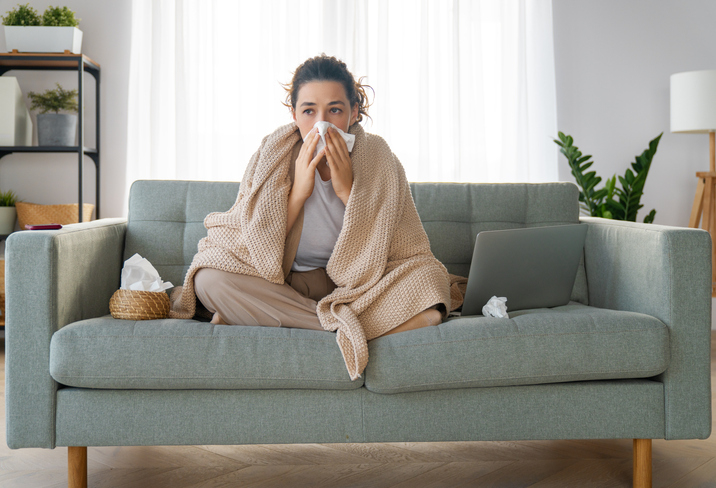Commitment + Clinical Leadership = Better Outcomes

8 Ways You Can Protect Yourself from the Flu
As the weather gets colder, flu season inevitably follows. The flu virus, also known as the influenza virus, is known to quickly spread and cause people to become ill during the colder weather.
While there is no way to completely protect yourself from getting the flu, you can use some flu prevention techniques to mitigate your chances of getting sick. Here are some tips on how to prevent the flu this year.
Get Your Flu Shot
Each year, experts estimate that the flu shot is 40-60% effective in reducing the risk of flu illness. Researchers work to identify the most common strains of the flu virus and develop an annual flu vaccine to combat the flu. In the 2019-2020 flu season before the COVID-19 pandemic, flu vaccines prevented an estimated 7.5 million influenza illnesses and 3.7 million influenza-associated medical visits.1
Many places offer flu vaccines, from pharmacies to clinics. You can call and schedule an appointment at your earliest convenience to get this year’s flu shot. If you have questions about the flu shot or would like to know any potential health risks you might encounter taking one, contact your doctor.
Avoid Contact with Sick Individuals
The flu virus is easily spread between people, and can travel through droplets when an infected person sneezes, coughs, or talks. If you stand near someone with the flu, infected droplets can get into your body through your nose, eyes, or mouth. This puts you at risk for infection, so you should work to avoid coming into contact with a sick individual.
You should also avoid touching anything that someone with the flu has handled. The influenza virus can live for at least 24-48 hours on hard surfaces and 18-12 hours on cloth, paper, and tissues.2 It can also live for up to five minutes on your hands after touching these surfaces, so if you unknowingly touch a surface with the flu virus and then touch your face, you could accidentally give yourself the flu.
Wash Your Hands Often
Did you know that only 5% of people are estimated to correctly wash their hands after using the bathroom? Most people will wash their hands for 6 seconds, but the CDC recommends washing for at least 20 seconds.3
You should wash your hands with warm water and soap, and scrub between the fingers, palms, and top and bottom of your hands. It is also recommended to wash your hands before eating, as well as between different activities where you might touch different surfaces.
Avoid Touching Your Face
According to a study, people touch their faces 23 times per hour on average.4 Touching your face after touching surfaces with viruses on them could potentially put you at risk of getting the flu.
As a precaution, try to avoid touching your face whenever possible. If you come in contact with objects or surfaces many people have touched, carry around some hand sanitizer in case you can’t get to a sink to wash your hands.
Strengthen Your Immune System
Your body’s natural immunity can help protect you from getting the flu. It is scientifically proven that those who lack sleep are more susceptible to colds and illnesses than those who get at least 7-8 hours of rest at night. When you sleep, your body releases proteins called cytokines that help combat infections, inflammation, and stress.5
A healthy diet can also help your body combat the flu and other viruses. Eat foods rich in antioxidants such as fruits and vegetables and avoid foods with little nutritional value such as sweets and fatty foods.
Use Antibacterial Cleaning Practices
Setting good habits in your home is another way you can prevent the flu. You should always clean commonly touched surfaces such as doorknobs and desks with antibacterial wipes, and disinfect areas such as sinks where bacteria might linger if left uncleaned.
Items such as utensils and drinking glasses should never be shared and cleaned immediately after use with antiviral dish soap. You should also wipe down anything that you share between family members, such as remotes or a desktop keyboard, before and after use.
Avoid Crowds
Crowded places or events may increase your chance of coming in contact with the flu virus. The flu virus can easily spread from person to person, and people who may not show any signs of the virus could unintentionally infect others nearby. For this reason, you should avoid crowds when possible, such as going to the grocery store when there are fewer people.
If you do get sick, you should stay home to prevent spreading the flu to others. You should wait until you no longer cough or have symptoms of the flu before going back in public.
Avoid Smoking
Another flu prevention tip is to avoid smoking. It is proven that smoking can weaken the immune system. Cigarettes contain over 7,000 compounds that can throw the balance of the immune system off and make the body more susceptible to illnesses.6
Furthermore, secondhand smoke can affect the immune systems of others in your household. Research conducted by the University of Rochester Medical Center found that secondhand smoke weakened the immune system of children and caused them to be more likely to have weakened immune systems.7
Protect Yourself from the Flu This Year
Now that you have some strategies on how to prevent the flu, you can prepare yourself for the upcoming flu season. Try incorporating some of these healthy habits into your lifestyle to decrease your chances of encountering the flu virus.
Saber Healthcare is an organization dedicated to providing consultant services to long-term care providers. This article is for informational purposes and is not meant to be seen as professional advice. Please consult with a medical expert before relying on the information provided.
Sources
- https://www.cdc.gov/flu/vaccines-work/vaccineeffect.htm#:~:text=While%20vaccine%20effectiveness%20(VE)%20can,used%20to%20make%20flu%20vaccines.
- https://pubmed.ncbi.nlm.nih.gov/6282993/#:~:text=Both%20influenza%20A%20and%20B,cloth%2C%20paper%2C%20and%20tissues.
- https://www.saberhealth.com/news/blog/washing-your-hands
- https://www.umms.org/coronavirus/what-to-know/prevention-safety/protect/not-touch-face#:~:text=Face%20Touching%20Is%20Common&text=Pay%20attention%20to%20how%20many,in%20contact%20with%20mucous%20membranes.
- https://www.mayoclinic.org/diseases-conditions/insomnia/expert-answers/lack-of-sleep/faq-20057757#:~:text=Yes%2C%20lack%20of%20sleep%20can,if%20you%20do%20get%20sick.
- https://www.cdc.gov/tobacco/sgr/50th-anniversary/pdfs/fs_smoking_overall_health_508.pdf
- https://www.urmc.rochester.edu/news/story/smoke-exposed-children-with-flu-more-likely-to-need-icu-care
